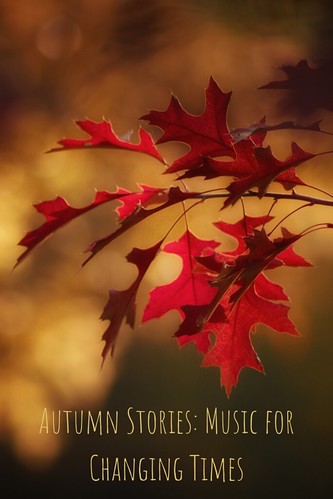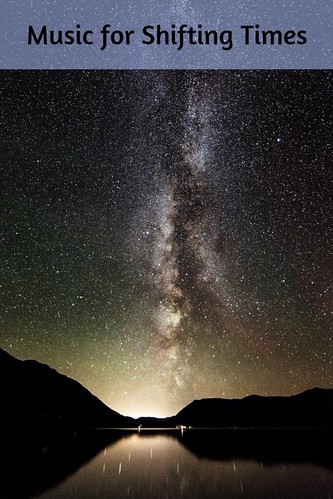Autumn Stories: Music for Changing Times
Music for shifting times: that's the title we came up with for this series of stories which I've been writing since the summer of 2016. Wherever you find yourself, things do seem to be in continual shift and at times and at an accelerating pace. Finding one's way through that sort of circumstance is an aspect musicians have often thought about.
Here are several musical ideas for you to consider, some practical, some mystical, all thought provoking.

Heather Rankin is from Mabou in Cape Breton, where she grew up in that small town area of Atlantic Canada as one of twelve children. Among other things, that gave her a sense of the changing seasons of family relationships and the importance of connection. Those are ideas she reflects upon in the song We Walk as One.
Though members changed and shifted over time, Heather and her brothers and sisters formed the The Rankin Family band, which went from touring around their home area to winning more than two dozen top Canadian music awards. Since the siblings decided to go their separate ways, Heather has forged a career as an actor, and in recent years has begun to record solo albums as well. You may find We Walk as One recorded on her album A Fine Line.
Carrie Newcomer looks an another aspect of ways to find hope and firm ground in shifting times in her song Learning to Sit with Not Knowing. You've met her music in this series before; she is from Indiana and regards her both her midwestern roots and her faith (she's Quaker) as definite aspects of her creativity. She's a thoughtful artist who often works with ideas of finding the sacred in the ordinary. At times that's through concrete images. At other times, as in this song, it is more through the power of language, rhythm, and voice. You will find Learning to Sit with Not Knowing on Newcomer's album The Point of Arrival.
No Frontiers was written by Irishman Jimmy MacCarthy. It has been recorded by a number of artists, among them top Irish singer Mary Black, who titled an album after the song and whose original version of it topped the Irish charts for many weeks. As you'll hear, it holds a number of memorable lines and phrases and to my mind is capable of many sorts of interpretation. That may be one reason why musicians have been drawn to cover it. I'll leave you to discern your own thoughts on the matter. Black herself has recorded the song several times, most recently with the RTE Orchestra on the album Mary Black Orchestrated. This video was made at the time she first recorded it, on the album called No Frontiers.
Music without words -- known as tunes in folk music tradition -- is also a good doorway to reflection and insight, one you have met before in this series. Desert Storm/Rounding Malin Head are the names of these two tunes, which may get you thinking before you've heard the first note. Listen, though, to see what they may reveal and inspire. They are played here by fiddle player Zoe Conway and guitarist John McIntyre, who come from County Louth in Ireland. Zoe wrote both tunes and you will find them recorded on their album Live In Concert: Zoe Conway and John McIntyre.
Rani Arbo and the three men who make up daisy mayhem look for music which offers meaning beyond the surface -- and they often have a very good time sharing what they find, in songs they write and in ones they choose to cover. That's true of the song Will Your House Be Blessed, written by Harry Manx. The long connection and deep respect among the four artists is present in the song, as is their sense of joy, discovery, humor, and sharing in the music. daisy mayhem are Andrew Kinsey on bass and whistles, Anand Nayack on guitars, Scott Kessel on percussion (take a look at his handmade drumkit), and Rani Arbo on fiddle and lead vocals. You will find this song on their album Some Bright Morning.
The title By the Time It Gets Dark may suggest a a story that is, well, dark. It's not. As things may turn and change and be uncertain (that not knowing that Newcomer sang of), still maybe "by the time it gets dark we'll be laughing..." . The song was written by Sandy Denny. This is Mary Black's version, which she first recorded on the album By the Time It Gets Dark. You may also find it on the 30th anniversary edition of By the Time It Gets Dark, from which this video comes.
Light and dark, joy and sorrow, knowing and not knowing, remembering kindness, remembering laughter, all these and a lot more are present in this music. In uncertain times, there's help and wisdom to found in the creative ideas of artists. May these songs help us all, in Jimmy MacCarthy's words as Mary Black sings them in No Frontiers, to be "warmer for the spark."
Thank you for staying with us through this journey. Below, you'll find a link that will take you to an article which has a bit more backstory on the series. It also has links to a number of the stories, including ones called Listening for Community, Music for Winter's Changes, and The Geography of Hope.

Kerry Dexter is Music Editor at Wandering Educators. You may reach Kerry at music at wanderingeducators dot com.
You may find more of Kerry's work in National Geographic Traveler, Strings, Perceptive Travel, Journey to Scotland, Irish Fireside, and other places, as well as at her own site, Music Road.



















